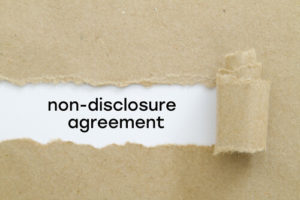Question of the Week — Should a Non-Disclosure Agreement Hush Up the Danske Bank Whistleblower?

Over the last month, a major financial scandal has roiled Europe. In September, Danske Bank, the largest bank in Denmark, announced that hundreds of billions of dollars in suspicious money had moved through its Estonia branch. Moreover, the company knew about the money, which originated in Russia and other former Soviet states, for years before taking action. In the wake of this tectonic money-laundering scandal, Danske Bank’s stock has plummeted by half, and the bank’s star CEO has resigned.
According to the Wall Street Journal, the illicit scheme came unraveled thanks to a single whistleblower: Howard Wilkinson, a British trader at Danske Bank’s office in Estonia. In 2012, Wilkinson discovered that a London-based business had reported no income or assets to U.K. authorities, even though the business had moved more than $480 million through his branch over five months. Ultimately, Wilkinson reported his concern to supervisors while continuing to investigate. He quickly discovered numerous other clients that had filed false reports in the U.K. By 2014, both Estonian authorities and the bank’s internal auditors had prepared scathing reports on Danske Bank’s practices, but the scandal would not come to light for years as executives sought to cover it up.
The breadth and longevity of the scheme led us to ask whether it is time for an anti-money-laundering whistleblower program. And multiple U.S. agencies-including DOJ, the SEC, and the Treasury Department-have opened investigations into the bank’s wrongdoing. Now, the European Union is looking for answers as well. The European Parliament has scheduled hearings on the scandal for November and invited Wilkinson to appear as a key witness. But they have run into one problem: a non-disclosure agreement Wilkinson signed that limits his ability to speak on the matter.
There is a long history of companies concealing wrongdoing through such agreements. Although the SEC and CFTC Whistleblower Programs have taken steps to address this issue, confidentiality agreements remain an impediment to whistleblowers. In the Danske Bank scandal, the European Parliament is stepping up to ensure the truth comes out. “We expect Danske to relieve Wilkinson of his non-disclosure commitments,” Jeppe Kofod, the spokesman for the EU’s special committee on financial crime, tax evasion and tax avoidance, told Bloomberg. “We want him to tell the truth and we can’t imagine Danske would want to keep him bound by it in the hearing.” So far, Danske Bank has not commented on the request.
What do you think? Vote below.
Tagged in: Money Laundering, Question of the Week,